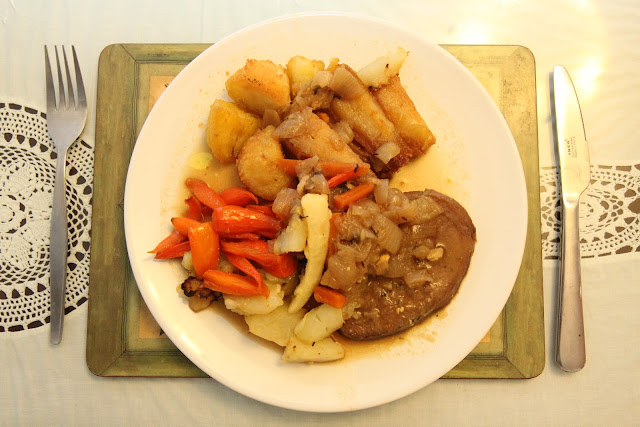We've adapted this recipe from Hugh Fearnley-Whittingstall's River Cottage Meat. It's a great recipe, we've just played with the temperatures and timings a little.
 |
| Roast pork belly with crackling and apple sauce, served with roast potatoes, broccoli and white cabbage |
For the pork:
- ~1kg Pork Belly
- A handful of fresh thyme leaves, chopped, or 1tsp dried thyme
- Salt and pepper
- A splash of olive oil
For the apple sauce:
- 2 Bramley apples, peeled and cut into small chunks (1-2cm)
- 1tsp lemon juice
- 1tsp sugar
Preheat the oven to 230°C
Place the pork into a roasting dish. With a sharp knife, score the skin, but being careful not to go all the way through the layer of fat. Sprinkle the thyme, salt and pepper over the skin with just a splash of olive oil and massage it into the skin, making sure to get it in the cracks. Don't over do the olive oil - it's just there to help you massage everything into the skin.
Place the pork in the oven. After 30minutes, turn the heat down to 160°C, and cook for another 1hr 20minutes. Roast potatoes will take about 1hr 20minutes at this temperature, so they can go in as soon as you turn the heat down (they're especially good if you've preheated the oil/fat in the oven at 230°C).
About 10 minutes before the end of the roasting time is a good time to start peeling apples, and cutting them into chunks. Put them in a saucepan and toss with lemon juice as you chop them, to ensure they don't go brown. Add the sugar, and a splash of water, and place over a low heat, stirring regularly, until it has turned to mush. Taste, and add more sugar if necessary.
About 10 minutes before the end of the roasting time is a good time to start peeling apples, and cutting them into chunks. Put them in a saucepan and toss with lemon juice as you chop them, to ensure they don't go brown. Add the sugar, and a splash of water, and place over a low heat, stirring regularly, until it has turned to mush. Taste, and add more sugar if necessary.
Mean while, once the pork is finished roasting, turn off the oven, open and leave for about 20minutes. If you're doing roast potatoes, you should take the roast potatoes out of the oven, place them on a plate so that they're not sitting in the oil, and then put them back in the oven to keep them warm.
Carve the pork by taking off the crackling, and cutting a thick slice from the meat for each of your diners. Serve the crackling resting across the meat, with roast potatoes and some greens such as cabbage, broccoli or peas. Let your guests serve the apple sauce themselves.

 The crab was boiled in salted water and allowed to cool completely. All the brown meat and white meat was then meticulously removed. I am very inexperienced in this matter so it took me around 45 minutes. I'd like to say it was worth it in terms of flavour but in hindsight I would probably buy fresh crabmeat from the fishmongers instead.
The crab was boiled in salted water and allowed to cool completely. All the brown meat and white meat was then meticulously removed. I am very inexperienced in this matter so it took me around 45 minutes. I'd like to say it was worth it in terms of flavour but in hindsight I would probably buy fresh crabmeat from the fishmongers instead.